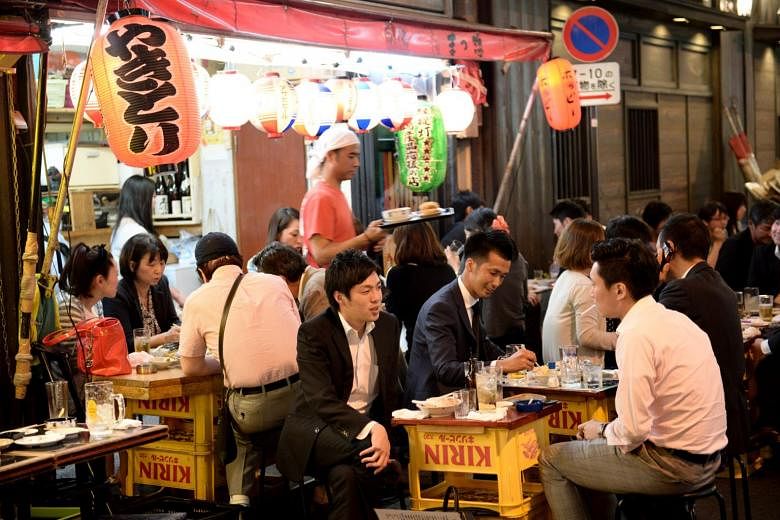TOKYO (BLOOMBERG) - It's time to stop drinking with the boss after work.
That's the message of Mitsubishi UFJ Financial Group banking unit executive Saiko Nanri, who wants to change Japan's longstanding culture of drinks between managers and employees.
Japanese companies have long encouraged such parties to give workers the chance to break down barriers with their bosses in an informal setting.
Some see the alcohol-fuelled bonding sessions as a way to relieve stress and advance their careers, while others feel obliged to attend. The practice is so ingrained that it sparked the term "nominication'' - from nomu, the Japanese verb for drink, and communication.
Ms Nanri, 49, has told her team that she won't hold the gatherings, saying they're unproductive and unfair to parents of young children.
"It's not as if I have any special knowledge to share with my staff by drinking with them every day,'' she said in an interview.
Her stance reflects how some Japanese workers are calling into question old work habits blamed for hindering productivity and discouraging women from remaining in the workforce.
Prime Minister Shinzo Abe has been trying to tackle a labour shortage in the rapidly ageing nation by making workplaces more flexible and reducing overtime. Some women in particular often resent having to entertain their superiors after a long working day.
"This dated practice shuts out working mothers, along with fathers who want to help out more at home, and foreigners who are used to a better work-life balance,'' said Professor Kumiko Nemoto at Kyoto University of Foreign Studies in Japan who has written about gender inequality in the workplace.
"Stopping nominication is the first step to increasing diversity, performance-based promotion and open communication during work hours.''
CAREER CONSEQUENCES
Because many Japanese companies don't have formal evaluation systems, managers often use the occasions to assess employees, according to Prof Nemoto.
That means not attending could have consequences for career advancement in a country that ranks among the lowest in the Organisation for Economic Cooperation and Development for women in management positions and on boards.
A mother of two teenage daughters, Ms Nanri wants to improve staff interactions during the daytime, and urges her team to spend time with friends and family at night.
Feedback has been positive, she said, with parents in particular telling her how they appreciated not feeling excluded by skipping team drinks.
Some in Japan would rather not be invited out in the first place.
"Younger staff aren't as keen to socialise with bosses as the older generation were,'' said Mr Hiroki Tahara, a human resources consultant.
Ms Saori Yano, 24, used to work at a job placement company in Tokyo where she and colleagues took turns going out with their manager several times a week after finishing work at around 10pm.
"He said he would listen to us over drinks because he was too busy during work hours, but usually we'd end up listening to his bragging," she said.
BOOZY 'BONEKAI'
Millennials are also showing less interest in year-end office parties, known as "bonenkai", or "forget the year gatherings" - many firms' biggest and booziest events. More than half of people in their 20s are at least indifferent to the occasions or dislike them, with the main reason being an aversion to socialising with the boss, according to a survey conducted last November by Neo Marketing.
But not all analysts are critical of nominication.
Senior Associate Professor Kazuaki Yamauchi from the University of Aizu in Fukushima, said the practice is necessary to foster smooth communication.
Assoc Prof Yamauchi did a study in 2011 based on interviews with about 30 business owners that laid out best practices he says still apply for after-work functions, ranging from seating arrangements to drinking advice and who should pick up the tab. "Alcohol can be a lubricating oil,'' he said.
Ms Nanri, one of the first female executives at Japan's biggest bank, wasn't always opposed to team bonding after hours. When she joined MUFG's predecessor in 1992, she used to play golf with her bosses and do everything she could to fit into the male-dominated culture.
After giving birth and returning to work, she found it hard to adjust to her new routine.
"I was shocked at how early I had to leave the office to get to the school on time,'' she said. "I didn't have a role model and didn't know what the best practice was as a working mother at a bank.''
She eventually made the adjustment, rising to the post of corporate communications head, overseeing about 100 employees. Last year, she became just the second woman at MUFG to reach the rank of executive officer, and this month, she was appointed head of the financial institutions division.
Ms Nanri hopes that younger women will have an easier time. She said her effort is just a "small attempt" at sparking changes in how to communicate.
Her approach isn't company policy, "but if it works, I'll recommend it to other departments".

